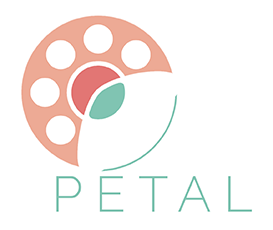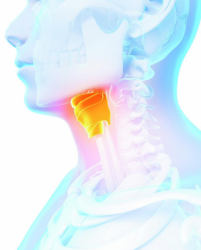

LARYNGECTOMY.NET
First step of phase I: exploratory analysis of needs
Analysis carried out with patients and caregivers
An analytical study to collect the therapeutic education needs of laryngectomised patients and their caregivers, was performed by Ms Mélanie Trocmé, under the direction of Pr Véronique Christophe from the cognitive and emotional sciences at the University of Lille, in collaboration with Ms Mélanie Seillier, psychologist at the Patient Education Resources and Training Centre (CERFEP) of Lille, in 2014.
In this manner, 41 individual interviews lasting an average of an hour were conducted, of which 20 with laryngectomised patients and 21 with caregivers.
The patients had undergone a laryngectomy 1 to 12 months before the interview, were primarily men (17, for 3 women), and their mean age was 57 years and 6 months. Among the 20 interviews, 18 were carried out at home.
Concerning the caregivers, they were primarily the spouses (16/21). Two of them were the sisters of the patients, two the children and one was the brother in-law.
The interviews performed were semi-direct, mainly with open questions, giving the patients and their caregivers plenty of speaking time. They were invited to discuss the main subjects of daily life: the main difficulties experienced, feelings and psychological aspects, the role of the couple, family circle and health providers, the social and professional impact.
These interviews were then analysed methodologically: meticulous reading, construction of a topic tree, identification of verbatim and analysis of the latter using Nvivo software. The recurrence of each topic could thus be identified.
The principal topics revealed by the analysis were:
• The positive aspects of the care
• Communication
• Alcohol-tobacco consumption
• The elements identified as the most difficult
• Emotions
• Identified resources (coping)
• The role of the caregiver
• The marital relationship
• The patient/caregiver relationship on a daily basis
• The attitude of others
• Self-image
• The medical world/ patient relationship
• Food
• Illness representation
• Associations
• Social problems
The skills of the CERFEP team in terms of therapeutic education, as well as the recommendations of the HAS allowed isolating among these 16 topics, those that fall under therapeutic education and which needed to be integrated in workshops.
The 9 topics retained are the following:
• Communication
• Self-image and attitude of others
• Illness and treatment representation
• Loss and bereavement
• The role of the caregiver
• Sexuality
• Resources
• Coping and emotions
• The treatments
First stage: assessment of education needs in:

